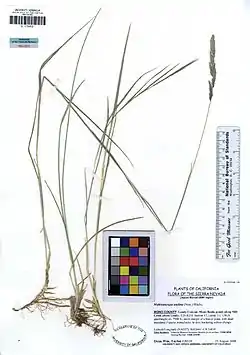Muhlenbergia andina
Muhlenbergia andina es una especie de la familia Poaceae conocida por el nombre común de foxtail muhly.
| Muhlenbergia andina | ||
|---|---|---|
 | ||
| Taxonomía | ||
| Reino: | Plantae | |
| (sin rango): | Monocots | |
| (sin rango): | Commelinids | |
| Orden: | Poales | |
| Familia: | Poaceae | |
| Género: | Muhlenbergia | |
| Especie: |
Muhlenbergia andina (Nutt.) Hitchc. | |
hábitat
Es nativa del oeste de Norteamérica desde Columbia Británica a California y Texas, donde se le puede encontrar en hábitat de humedales tal como prados húmedos, pantanos y bancos de ríos.
Descripción
Es una hierba perenne rizomatosa que alcanza una talla de 25 a 85 centímetros.
La inflorescencia es un racimo denso de ramas apegadas, verticales que llevan las espiguillas pequeñas, con pilosidades sedosas.
Taxonomía

Muhlenbergia andina fue descrita por (Nutt.) Hitchc. y publicado en Journal of Botany, British and Foreign 66: 141. 1928.[1]
Muhlenbergia: nombre genérico que fue otorgado en honor de Henry Ernest Muhlenberg.
andina: epíteto geográfico que alude a su localización en la Cordillera de los Andes.
- Sinonimia
Véase también
Referencias
- «Muhlenbergia andina». Tropicos.org. Missouri Botanical Garden. Consultado el 26 de noviembre de 2014.
- «Muhlenbergia andina». The Plant List. Consultado el 26 de noviembre de 2014.
- «Muhlenbergia andina». Royal Botanic Gardens, Kew: World Checklist of Selected Plant Families. Consultado el 26 de noviembre de 2014.
Bibliografía
- ADAMS, C. C.1902. Southeastern United States as a center of geographical distribution of flora and fauna.BioI. Bul. 3:115-3
- BEAL, W. J.1891. Geographical distribution of the grasses of North America. Amer. Assoc. Adv. Sci. Proc.(1890) 39:312.
- BEETLE, A. A.1943a. The North American variations of Distichlis spicata. Torrey Bot. Club Bul. 70: 638-50.1943b. Notes on the distribution of California grasses. Leaflets West. Bot. 3: 258-60. 1943c. Thephytogeography of Patagonia. Bot. Rev. 9:667-79.1945. A new section Microphyllae in Agrostis. Torrey Bot. Club Bul. 72:541-49. 1946a. Notes on the distribution of California grasses II. Leaflets West. Bot. 4:285-289. 1946b. A new alpine Glyceria from California. Madroño 8:160-61.
- BENSON, L. 1941. Taxonomic studies. Amer. Jour. Bot. 28:358-
- BOLANDER, G.1866. Grasses of the state. California State Agr. Soc. Trans. 1864-65:131-45.
- BOYLE, W. S.1945. A cyto-taxonomic study of the North American species of Melica. Madroño 8:1-26.CAMPBELL, D. H.1944. Relations of the temperate floras of North and South America. California Acad. Sci. Proc.25:139-46.
- CHANEY, R. W.1934. Redwoods of the past. 7 p. Published by Save-the-Redwoods League, Berkeley, Calif.CLEMENTS, F. E.1934. The relict method in dynamic ecology. Jour. Ecol. 22:39-68.
- CONZATTI, C.1943. Poaceas. p. 111-220. In: Flora taxonómica Mexicana. vol. 2. Monocotiledóneas. 279 p.Porfirio Díaz B., Oaxaca, Juárez, Mex.
- COOKE, W. B.1940. Flora of Mount Shasta. Amer. Midland Nat. 23:497-572. 1941. First supplement to theflora of Mount Shasta. Amer. Midland Nat. 26:74-84.
- COOPER, W. S.1922. The broad-sclerophyll vegetation of California: an ecological study of the chaparral andits related communities. Carnegie lnst. Washington Pub. 319:1-124.1936. Strand and dune flora of the Pacific Coast. p. 141-87. In: Goodspeed, T. H. Essays ingeobotany in honor of William Albert Setchell. xxvi + 320 p. University of CaliforniaPress, Berkeley, Calif.
- DAVY, J. B.1902. Stock ranges of northwestern California: notes on the grasses and forage plants and rangeconditions. U. S. Dept. Agr. Bur. Plant Indus. Bul. 12:1-81.
- DORE, W. G., and A. E. ROLAND. DORE, W. G.1941-42. The grasses of Nova Scotia. Nova Scotian Inst. Sei. Proc. and Trans. 20:177-288.
- EASTWOOD, A.1901. General botanical features of the Coast Mountains of California. Science (n.s.) 14:600.1941. The islands of southern California and a list of the recorded plants. Leaflets West. Bot.3:27-36.
- FOURNIER, E.1876. Sur la distribution geographic des Graminees Mexicaines. Ann. Soc. Nat. (ser.6) 9:261-90.
- GOULD, F. W.1945. Notes on the genus Elymus. Madroño. 8:42-47.
- GRAY, A.1846. Analogy between the flora of Japan and that of the United States. Amer. Jour. Sci. (n.s.)2:135.1858-59. Observations upon the relations of the Japanese flora to that of North America and ofother parts of the north temperate zone. Amer. Acad. Arts and Sci. Mem. (ser. 2) 6:377-452.
- GRIFFITH, D.1912. The grama grasses. U. S. Natl. Mus. Contrib. U. S. NatI. Herb. 14:343-428.
- HENRARD, J. TH.1938. Vicarious grasses, as demonstrated by a new species of Phalaris from South America.Blumea 3:168-72.
- HENDRY, G. W.1931. The adobe brick as a historical source. Agr. Hist. 5:110-27.HITCHCOCK, A. S.1923. Gramineae. (Revised by A. Chase.) p. 72-144. In: Jepson, W. L. (1925).1927. The grasses of Ecuador, Peru, and Bolivia. U. S. NatI. Mus. Contrib. U. S. NatI. Herb.24:291-556. (See specifically p. 397.). 1935. Manual of the grasses of the United States. U. S. Dept. Agr. Misc. Pub. 200: 1-1040.
- HITCHCOCK, A. S. and AGNES CHASE.1910. The North American species of Panicum. U. S. NatI. Mus. Contrib. U. S. Natl. Herb.15:1-396. 1920. Revisions of North American grasses. U. S. NatI. Mus. Cohtrib. U. S.NatI. Herb. 22:1-77. (See specifically p. 45-77.)
- HOOVER, R. F..1941. The genus Orcuttia. Torrey Bot. Club BuI. 68:149-56.
- HOWELL, J. T.1946. Notes on the grass family in Marin County, California. Leaflets West. Bot. 4:243-47.
- JEPSON, W. L1925. A manual of the flowering plants of California. 1,238 p. Associated Students Store, University of California, Berkeley, Calif.
- JOHNSON, B. L.1945. Cyto-taxonomic studies in Oryzopsis. Bot. Gaz. 107:1-32.
- JOHNSTON, I. M.1943. Plants of Coahuila, eastern Chihuahua, and adjoining Zacatecas and Durango, II. Jour.Arnold Arb. 24:375-421.JONES, B. and R. M. LOVE.1945. Improving California ranges. California Agr. Exp. Cir. 129:1-48.
- LAWRENCE, W. E.1945. Some ecotypic relations of Deschampsia caespitosa. Amer. Jour. Bot. 32:298-314.
- MCARDLE, R. E., et al. 1936. The white man's toll. U. S. —Congo Senate Doc. 199:81-116.
- MCKENNEY, R. E. B..1901. Notes on plant distribution in southern California, U. S. A. Bot. CentbI. Beihefte. Abt. B,10:166-76.
- PARODI, L. R.1928. Sinposis de las Gramíneas Argentinas del género Muhlenbergia. Physis 9:205-22. 1937. Contribución de estudio de las Gramíneas de género Paspalum. Rev. del Mus. de laPlata (n.s.), Sec. Bot., 1:211-50. 1941. Revision de las Gramíneas Sudamericanas del género Hicrochloe. Rev. del Mus. de laPlata (n.s.), Sec. Bot., 3:183-212.
- PIEMEISEL, R. L., and F. R. LAWSON.1937. Types of vegetation in the San Joaquin Valley of California and their relation to the beet leafhopper. U. S. Dept. Agr. Tech. Bul. 557:1-28.
- PURER, E.1942. Plant ecology of the coastal salt marshlands of San Diego County, California. Ecol.Mono. 12:81-111.
- RIGG, G. B.1933. Notes on a sphagnum bog at Fort Bragg, California. Science (n.s.) 77:535-36.
- ROBBINS, W. W.1940. Alien plants growing without cultivation in California. California Agr. Exp. Sta. Bul. 637:1-128.
- RUSSELL, R. J.1926. Climates of California. Univ. California Pubs. Geog. 2:73-84.
- SAMPSON, A. W.1944. Plant succession on burned chaparral lands in northern California. California Agr. Exp. Sta. Bul. 685:1-144.
- SAMPSON, A. W., and AGNES CHASE.1927. Range grasses of California. California Agr. Exp. Sta. Bul. 430:1-94. (Out of print.) .
- SCRIBNER, F. L., and E. D. MERRILL.1910. The grasses of Alaska. U. S. Natl. Mus. Contrib. U. S. Natl. Herb. 13:47-92.
- SHANTZ, H. L., and R. L. PIEMEISEL.1924. Indicator significance of the natural vegetation of the southwestern desert region. Jour.Agr. Res. 28: 721-802.
- STANLEY D. Jones, J. K. Wipff, Paul M. Montgomery - 1997 - Gardening - 404 páginas
- STEBBINS, G. L., Jr., and R. M. LOVE.1941a. An undescribed species of Stipa from California. Madroño 6: 137-41. 1941b. A cytological study of California forage grasses. Amer. Jour. Bot. 28:371-82 ST. *JOHN, H.1915. Elymus arenarius and its American representatives. Rhodora 17:98-103. 1941. The status of Poa secunda and of Poa sandbergii Gramineae in North America. In: Newand noteworthy northwestern plants, part 8. Amer. Jour. Bot. 28:78-81.`
- SWALLEN, J. R. 1941. New United States grasses. Washington Acad. Sci. Jour. 31:348-50. 1944. The Alaskan species of Puccinellia. Washington Acad. Sci. Jour. 34:16-23.
- THURBER, G.1880. Gramineae. In: Watson, S. Geological survey of California. Botany, vol. 2, p. 253-328.
- TRANSEAU, E. N.1903. On the geographic distribution and ecological relations of the bog plant societies of northern North America. Bot. Gaz. 36:401-20.
- WEAVER, J. E., and T. J. FITZPATRICK 1932. Ecology and relative importance of the dominants of tall-grass prairie. Bot. Gaz. 93:113-50.
Enlaces externos
 Wikispecies tiene un artículo sobre Muhlenbergia andina.
Wikispecies tiene un artículo sobre Muhlenbergia andina. Wikimedia Commons alberga una categoría multimedia sobre Muhlenbergia andina.
Wikimedia Commons alberga una categoría multimedia sobre Muhlenbergia andina.- Jepson Manual Treatment
- USDA Plants Profile
- Grass Manual Treatment
- Photo gallery